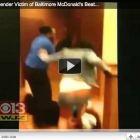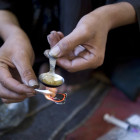
Anti-Bullying Programs Pushed Aside by Federal Budget Woes
|
On March 10, President Obama turned up the spotlight on school bullying. For a couple of years, a handful of high-profile tragedies — often having to do with the rising problem of students picking on other students via social media — had brought unprecedented attention to the issue. Now, the White House was holding its first ever “Conference on Bullying Prevention.” And the president and the First Lady welcomed an audience of parents, educators, advocates and government officials by expressing how seriously they took the issue -- both as leaders and as parents. “We’ve got to make sure our young people know that if they’re in trouble, there are caring adults who can help and young adults that can help,that even if they’re having a tough time, they’re going to get through it, and there’s a whole world full of possibility waiting for them,” Obama said. “We also have to make sure we’re doing everything we can so that no child is in that position in the first place.”
Here’s the irony: At the same time that educators, parents and politicians decry bullying and other school violence, the Obama administration has presided over the elimination of all funding for the chief federal program designed to prevent school violence — a program that had been the backbone for anti-school-violence efforts across the country.








